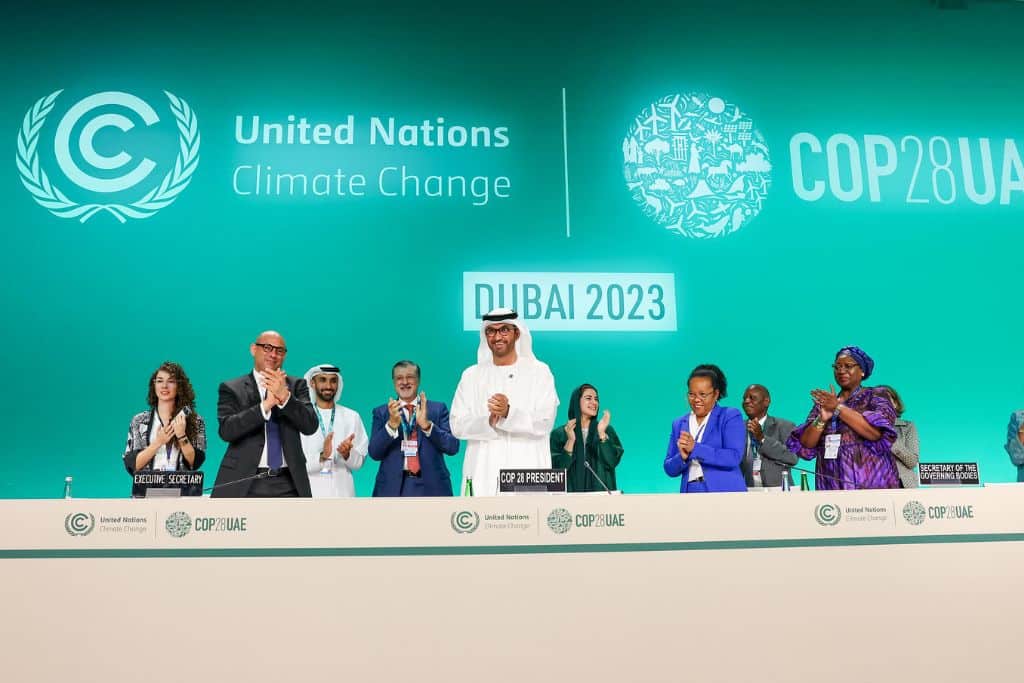While failing to explicitly call for a “phase-out” of planet-warming oil and gas, the deal, announced in the early hours of Wednesday, marks the first time a COP agreement includes language on fossil fuels.
—
Following weeks of intense negotiations and a series of “disappointing” draft texts, COP28 has finally come to an end with the announcement of a deal that saw countries commit to move away from fossil fuels for the first time in history.
The COP28 deal calls on countries to “transition away from fossil fuels in energy systems, in a just, orderly and equitable manner to achieve net-zero by 2050 in keeping with the science.”
“Let us finish what we have started,” said COP28 President Sultan Al Jaber as he announced the agreement, as the room erupted in applause. He called it a “historic achievement” but added that its true success would be in its implementation.
Al Jaber, who is the head of state oil giant Abu Dhabi National Oil Company (Adnoc), faced huge backlash last week for comments he made during an online event ahead of the Dubai summit, where he said that “there is no science out there, or no scenario out there, that says that the phase-out of fossil fuel is what’s going to achieve 1.5C.”
While falling short of the key “phase out” of fossil fuels that 120 countries, including the European Union, called for, the final agreement does break new ground. It is the first time a COP text mentions moving away from planet-warming oil and natural gas, fuels that have underpinned the global economic development for nearly a century.
Efforts to use a stronger language have been hindered by representatives of the fossil fuel industry and many fossil fuel-producing countries, forcing delegates to find a compromise.
In a letter written in response to a draft agreement published last week, the head of the Organization of the Petroleum Exporting Countries (OPEC) Haitham Al Ghais urged OPEC members to “proactively reject any text or formula that targets energy i.e. fossil fuels rather than emissions,” saying the text put “undue and disproportionate pressure” on the fossil fuel industry.
“COP28 needed to signal a hard stop to fossil fuels and their planet-burning pollution,” said UN Climate Change Executive SImon Stiell at the closing plenary of COP28, who added that, while humanity didn’t “turn the page on the fossil fuel era,” the moment still marked “the beginning of the end.”
You might also like: Did COP28 Succeed or Fail?
Reactions
The deal has sparked mixed reactions. While many celebrate the language on fossil fuels as a “historic win” for climate diplomacy and for the world, activists, experts, and some countries – particularly developing ones – note that some key targets, such as a commitment to peak emissions by 2025, are missing.
“The decision at COP28 to finally recognize that the climate crisis is, at its heart, a fossil fuel crisis is an important milestone. But it is also the bare minimum we need and is long overdue. The influence of petrostates is still evident in the half measures and loopholes included in the final agreement,” said former US Vice President Al Gore.
Omar Elmawi from the Africa Movement Building Space urged not to “underestimate the cunning tactics of fossil fuel giants and petrostates.”
“They will cleverly disguise their products as ‘transitional’ fuels, especially in the most vulnerable corners of our world,” he said.
COP28 went down in history as the summit with the highest presence of fossil fuel lobbysts, which outnumbered delegations from all but one country.
Targets on nature, food, and the ocean were retained, though critics say the language is not strong enough to prevent long-term disruptions and irreversible impacts.
“It is disappointing to see countries not including the recommedation by the IPCC to protect 30 to 50% of alll ecosystems,” said Fernanda Carvalho, global climate and energy policy lead at WWF. “While countries again recognized the importance of nature-based solutions, we should have seen ambition on combined climate-nature action increasing, particularly in the wake of the landmark Kunming-Montreal Global Diversity Framework agreed this time last year.”
Featured image: UNclimatechange/Flickr
For an in-depth summary of the key agreements from COP28, check out Earth.Org’s Week 1 and Week 2 recap articles.


















